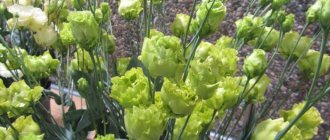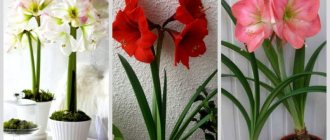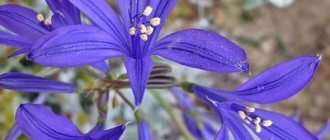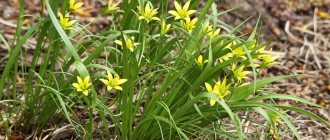White color expands the space and fills it with a feeling of lightness, so decorating the garden with white flowers is a great idea. White petals harmonize with green leaves and create a composition with multi-colored varieties. Flowers can be used in flower beds and bouquets and as decorative elements along paths and borders.
You can plant not only beautiful perennial flowers, but also shrubs. Some varieties of fruit plants have white buds during the flowering period. This method of garden design is popular in design. There is no need to be afraid of monotony; the white palette comes in many shades.
Bulbous
Among the bulbous plants with beautiful white flowers, the lily is famous. The flowers in the garden grow tall and look impressive. When they bloom, the garden is filled with a scent that white lilies retain for a long time. Lily comes in several varieties; you can choose flowers of any shape.
Tulips are also bulbous plants. Beautiful white tulips bloom in the garden in the spring, but the plant's bulbs must be planted in the fall.
If there are not enough tall flowers for the garden composition, you need to plant gladioli. White varieties are full of splendor, the flowers are devoid of monotony and can be used in the garden.
Zinnia graceful Lime
Tall (90-100 cm) fast-growing annual with large (13-15 cm) densely double inflorescences. It is distinguished by abundant and long-lasting flowering - the first zinnia buds bloom at the end of June, and the last ones fall almost on the eve of the first frost.
They are highly resistant to bad weather, as they are not afraid of rain, gusty winds, or the scorching summer sun. Traditionally, zinnias are grown in seedlings, but in warm spring conditions it is permissible to sow them in open ground.
- Beautiful zinnia: varieties, cultivation and diseases
White, red, yellow, scarlet, purple, pink and even green zinnias are an excellent decoration for any flower garden.
Perennial flowers
Beautiful perennials have been used for garden decoration for a long time, but they need good care. To ensure large buds, plants with white flowers must be thinned out and fertilized.
Stems with leaves must be cut off before frost. This is how perennial flowers in the garden endure winter better and grow more beautiful.
Delphinium is a typical representative of perennial garden plants with snow-white flowers. When planting, it needs to be given a well-lit place in the garden. Delphinium has beautiful small light flowers that look like eyes.
Small, beautiful flowers add splendor to a garden when planted in a continuous carpet. This is how unusual flower arrangements are made in the garden, and alpine slides are organized in areas.
The most beautiful perennials in the garden are white rose bushes. But white roses get sick, and the bushes need careful care from the beginning of planting. The rose is available in varieties with large and small inflorescences and leaves, it is suitable for decorating any space in the garden.
Clematis
Clematis is a favorite of many summer residents. The liana looks simply luxurious if its shoots are beautifully distributed on a trellis or pergola. The most common white clematis is “Jerzy Popieluszko”. This variety blooms all summer - from June to September. Flowering occurs on last year's shoots, which must be securely covered for the winter to preserve them. The liana reaches the peak of its beauty at the age of 5.
Exotics are nearby: 10 not quite ordinary plants that you can plant in your garden
Popular varieties of white clematis include: "Fargesioides", "Summer Snow", "Arctic Queen", "Bella", "Cassiopeia". “Joan of Arc” looks very impressive; the cultivar belongs to the group of giants. Small-flowered varieties look no less impressive and have a delicate aroma; their shoots do not cling to the support on their own, so they require a garter. The best place to plant clematis is in an area with light shade. The culture is unpretentious in care.
Flowering shrubs
Shrubs along paths look beautiful and give your garden a luxurious look. Peony is popular in every area; its large petals and leaves deprive the garden space of monotony. At the end of the season, flowers should be cut and bouquets made that will also delight.
Spiraea is a plant with white flowers. The name is known to those who like to create group compositions along the paths of the plots. Among the ornamental plants for the garden, the perennial weigela is common. It has inflorescences of an interesting tubular shape.
On the site you can plant a flowering tree - lilac with snow-white flowers. Peonies bloom with lilacs at the same time, and the garden is filled with an aroma whose splendor cannot be described. If you plant a flowering tree with leaves in the garden, it can be used as a shelter. Often an alley along paths is organized in the garden. This saves from monotony and decorates the garden space.
The viburnum bulldonezh tree also attracts with its large light inflorescences. It is better to trim the bushes, giving them a beautiful shape. These perennials can be used to decorate garden objects. Some bushes are planted near gazebos and garden fences. Climbing perennials become an extension of the garden composition, and when they bloom, they add splendor to your garden.
Eustoma
Photo newplantsandflowers.com
Despite the obstinate nature of eustoma, many gardeners do not lose hope that one day this beauty will change her anger to mercy and will still rise. And they love this stubborn decorative culture, among other things, for its wide variety of tones and shades. The following varieties and hybrids boast an unusual soft green color of flowers:
Lime Green from the Mariachi series. Tall (75-90 cm) eustoma with large 5-7 cm flowers.
Green from the Super Magic series. It is distinguished by large double flowers of a pale green hue. In our country this variety is also known as Green Alley.
Green from the ABC series. Perhaps one of the tallest plant varieties, which can reach 100 cm in height.
White annuals
Not only white perennials are used when decorating a space. Annual decorative flowers and plants also participate in planting. Although the flowers die off in the fall, in the summer they are placed in flower beds, where they remain beautiful and can be enjoyed throughout the flowering period.
Spring
The snowdrop is considered the most springlike. It grows first, then other white bulbous plants bloom, and the time comes for beautiful spring fruit trees and bushes. White tulips create a spring mood in the garden.
When organizing beautiful minimalist areas in the garden, annual spring plants with small white flowers are used for uniformity. They cover the ground well and do not grow large. These flowers include alyssum. This plant blooms in the garden for a very long time.
Summer
In summer, annual flowers and perennials create an amazing ensemble and fill the garden with their aroma. A flower called petunia smells pleasant. In summer it blooms with large beautiful flowers. It is easy to care for, the plant tolerates unfavorable conditions well, and it is necessary to plant it.
The shortest annual plant is called snow-white iberis. The flower size is no more than 30 centimeters. The color of Iberis fully conveys its name.
Dimorphotheca has beautiful white flowers, but they seem simple and full of monotony. It looks like a daisy, with the same center and small petals, but it blooms longer.
If small flowers are not suitable for decorating areas, you can take larger flowers. Datura has large white buds. The shape of the flower resembles a bell. The dimensions of the datura can be more than a meter. It is better to place flower beds with it near the fence and borders.
Autumn
Ageratum blooms until mid-autumn. The color of its flowers does not change for a long time. Some perennials are used as annuals. These flowers include winged tobacco. Only white buds can delight with aroma, and colored tobacco has no smell. Tobacco is popular for planting in clubs. Sometimes other flowers, plants and bushes can be used with it to avoid monotony in the design.
Asters are characteristic of autumn. They also come in white. As a rule, these are large flowers.
Until the end of autumn, bushes of a plant called osteospermum can be used. The description of the plant is similar to that of chamomile. Osteospermum inflorescences also have a center, but are blue. The bushes reach large sizes and tolerate frost and heat equally well.
Rose
It is not for nothing that the rose is considered the queen of the garden. This flower combines lush splendor and sophistication at the same time. White roses look especially elegant. The flower size of this crop varies depending on the species. The largest buds are produced by the hybrid tea rose; the diameter of its flowers reaches 14 cm. The bushes themselves grow in height from 0.5 to 1.5 meters.
Floribunda is distinguished by the fact that its buds are collected in lush clusters. Flowers are semi-double and double. Climbing roses are placed in a separate class. To grow, they need strong support, as the shoots can reach several meters in length.
White ground cover roses are considered the most frost-resistant; they can be safely planted even in northern regions. Flowers not only look great, but can also produce a pleasant aroma with classic, fruity and spicy notes. Many varieties of roses bloom in 2 waves.
Zephyranthes
Zephyranthes is popularly called an upstart, because its flower stalks develop very quickly and often appear before the leaves. In its homeland, the flower begins to bloom after seasonal heavy rains brought by the western wind, so the name of the plant is literally translated as “flower of the western winds.”
Zephyranthes flowers appear singly and look like white lilies or crocuses.
Zephyranthes can rarely be found on windowsills, although this plant is absolutely unpretentious:
- It is better to place the flower in well-lit rooms on the southwest side of the house. And for the summer season, the upstart can be moved to the veranda.
- The optimal temperature in summer is 29-23 degrees, and in winter – 11-13 degrees.
- Irrigation procedures should be regular and plentiful. But you should not allow water to stagnate in the pot. After flowering, watering should be reduced and the plants should be allowed to drink only after the top layer of soil has dried.
- Fertilizing should be applied during the growing season and flowering in the form of a solution of complex mineral fertilizers at intervals of two weeks.
- The plant is replanted annually, because many baby bulbs are formed during the season and Zephyranthes becomes cramped in the pot. The procedure should be carried out at the beginning of the rest period.
Mysterious callas and fluffy asters
Zantedexia, or white callas, are flowers from the Araceae family. To plant them, prepare areas of land open to the sun with nutritious soil. White calla lilies flowers reproduce by bulbs, seeds and division. It is interesting that the part called the flower is not such at all, but is only a covering leaf that covers the ear of the inflorescence. In fact, the plant has inconspicuous but fragrant flowers. White callas go well with flowers that like moderate but frequent watering.
Dwarf and tall asters are easy to care for. The varieties Albus and “Serenade” take root well in our climatic conditions, which, growing like a white carpet, are able to decorate the background of a flower bed or an alpine hill. If you decide to collect aster seeds yourself, please note that over the course of a year of storage they lose their viability by 35-40%.
Tulip Green Jay
A late-blooming variety of green-flowered tulips with large 6-10 cm flowers. The height of the plant is about 40 cm, the flower petals are fringed. At the very beginning of flowering, the color of the perianth tends more to green, but if the flower grows in the sun, then gradually the edges of the petals begin to turn yellow. However, even in this case, the center of the petal remains green.
- 15 main types of tulips - do you have everything (photos, descriptions, varieties)
All classes of tulips in one article
The first blueberries
White flowers that appear immediately after tulips and daffodils have at least two names: scillas and hyacinths. In the first ten days of April they begin to bloom, and their aroma is appreciated by many gardeners and simply amateurs.
Scillas reproduce by babies, which can independently spread throughout the garden. They do not require special conditions - a little sun and suitable soil, preferably sandy loam or loam.
Molucella (Irish bluebell)
In the middle zone, molucella is grown as an annual. This is a tall 70-90 cm plant with branched shoots and powerful peduncles, collected in a kind of bush. Molucella leaves are rounded, with serrated edges.
However, it is not they that attract attention, but the bracts of this plant - pale green funnel cups surrounding small white molucella flowers. Pseudobells collected in a dense spikelet inflorescence look very elegant and unusually impressive. The original molucella “candles” will decorate the flower garden for a very long time - from the end of June to mid-September.
- 16 charming flowers that look like bells
Want more bluebells in your garden? There are 16 of them on our list!
First spring greetings
With the first spring sun, garden perennials, familiar to us from childhood, awaken - the celebration of March 8 is not complete without them. These are daffodils, the flowering period of which begins in the southern latitudes of Russia in March and ends in April. The further north you go, the later this flower begins to open.
It is quite unpretentious and thrives in the sun and in the shade with little access to light. Its aroma instantly spreads throughout the room as soon as you place the bouquet in the vase. There are many varieties of narcissus - in addition to the well-known yellow flower, there is also a white one.
Bring it into your monochrome garden as the opening flower ball.
Wax ivy
This white flower (pictured below) will immediately come to mind as it often decorates homes and office interiors. Its name is wax ivy (lat. Hoya carnos) or hoya. But not everyone had the opportunity to see it bloom. Its vine-shaped stem reaches 4 m. The leaves are dense, dark green in color and have a characteristic wax-like surface. The plant is quite unpretentious and has several varieties.
One of them, the beautiful Hoya, is more picky about care than its fellows. She needs warmth and humidity, but avoids bright light. Its leaves are not glossy, and they are smaller in size.
In winter, Hoya feels great at a temperature of 10-13 degrees and with moderate watering. With the onset of spring, it needs more moisture and sunlight (but not direct rays). Propagated by cuttings during the spring awakening.










